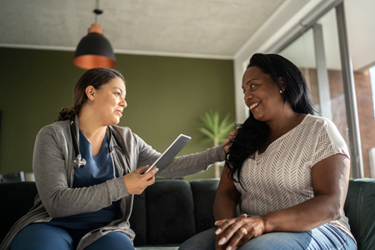Understanding Lupus Trial Participation And The Importance Of Patient Support
A conversation with Caroline Donovan, director of patient engagement, Lupus Therapeutics, the clinical research affiliate of Lupus Research Alliance

From a patient perspective, deciding whether to enroll in a clinical trial that could potentially treat their symptoms — or wreck their relative normalcy on current medications — is a precarious position. And that’s if the patient has been diagnosed properly. These are two common challenges of clinical trial enrollment for patients living with lupus. So, what’s a sponsor company to do?
Lupus Therapeutics Director of Patient Engagement Caroline Donovan explores these challenges and points to the Lupus Therapeutics PALS (Patient Advocates for Lupus Studies) program as one way to build patient knowledge and trust as they embark on trial participation.
What are the challenges in identifying lupus patients’ eligibility for clinical trials?
Taking a step back, it has to be someone who actually has a confirmed medical diagnosis of lupus, and that is such a challenge. I still hear from individuals for whom it has taken years to get a diagnosis; three years is pretty typical. Of course, there are people who luck out and have a provider who listens and knows about lupus, but so many people are told it’s another illness or they’re just stressed out — especially women of childbearing age.
Specific to trials, individuals who are getting diagnosed in the emergency department are being offered a lupus trial, as opposed to those who are diagnosed by a rheumatologist. And then there is an issue with the way the eligibility criteria is written. We hear from so many people who have been told they’re too healthy to participate in a trial. I’ve heard of one individual who has tried 13 times to enroll in a trial, and every single time she’s rejected as ineligible. Trial enrollment is also challenging, because everyone experiences the disease so differently. What appeals to one individual in a trial might not appeal to another individual in a trial. The recruitment really has to be tailored to the individual, which is harder to do and takes more time.
What challenges with recruitment and enrollment delay clinical trial timelines?
If recruitment is such a challenge or the study needs a protocol amendment, that delays the trial and increases its cost. There has been research that if you can incorporate a patient voice and avoid a protocol amendment or improve enrollment adherence and retention, there is financial value for the companies. This is a few years old, but a presentation at DIA meeting showed the financial value of designing a patient-centric trial; it actually had a 20% increase of successfully launching. That wasn’t specific to lupus and was a few years ago, but I think with the increased patient involvement in the last few years and an even larger focus on patient centricity the benefit to the companies of involving patients will increase.
What are some of the biggest factors in a patient with lupus choosing to participate in a clinical trial?
A major factor that plays into an individual’s decision to participate is whether or not they would have to come off their current treatments and go through a washout period before the trial. That is very scary, because they believe coming off their medication can immediately lead to a flare, and they don’t want to have to go through a flare to see if the trial treatment fixes it. It’s the fear of “Why mess with something? I’m doing okay right now. Maybe not the best, but at least it’s the known symptoms versus what could happen if I do have to come off all of my medications.” I think that’s a big final step that individuals can’t or don’t want to take. Additionally, their relationship with their provider and if this is something their healthcare provider plays a huge part in decision making process, as well as the impact that the trial would have on their daily lives.
And then there’s keeping the patient engaged and enrolled in the trial. Any challenges that you note there?
For some people, it’s the side effects. For others, some will start thinking, “I’m on the placebo, so I might as well come off.” That’s definitely something we’ve heard. If you look at the theory of behavior change and what we found, people are excited at first and think they can do it. But then they start doing it and life happens, and there are other things that take priority and staying on the trial becomes too much. That’s when a lot of the support services are an important need.
As a field, we are improving the support services we offer, but I don’t think there’s always knowledge about those. The provider needs to make the individual feel comfortable asking questions or for help. Patients often don’t know they can tell their doctor they would consider participating in a trial but childcare is a barrier. They might not realize there is a support service to help with that — or transportation, housing, or food. There’s a lot of trust needed in the conversation with the provider to even make a patient feel comfortable bringing that up. For the provider, it’s asking the patient what support services they would need to participate, not whether they need any support services. It’s allowing the individual to feel comfortable opening up.
Along those lines, are there any other approaches or strategies that can help patients enroll and stay enrolled in a trial?
One thing that has seen successful is our PALS (Patient Advocates for Lupus Studies) program, and that’s relying on peer education and support. We’ve heard from providers that to make some individuals feel comfortable enrolling in a trial, they would need to have the ability to speak to them for two to three times the amount of a normal clinic visit, which is not always possible. . That’s where the PALS program comes in, with individuals living with lupus who have previously participated in a trial, who can tailor their education approaches and their conversations to meet patients where they are. For example, if one individual is saying, “Nope, not doing a trial. I don’t want to be a guinea pig,” the PALS would work with that individual very differently than an individual who is open to a trial but worried about logistics, aspects like transportation or childcare.
The PALS are filling the void left in education, in communicating the importance of participating in the trial and why participation by individuals living with lupus, especially individuals of color, is so important. r. One of the PALS we work with, she always comments, “When I was on a trial, the doctor was waiting on me. She was offering me water. She said, ‘What do you need?’” They cover the positive aspects and just let people know what they are really signing up for.
So, let’s talk a little bit about patient input. At what point and how should pharmaceutical companies think about talking to these patients?
They should be talking to them in the discovery phase; patients could and should be involved in things like pipeline reviews and even providing input into which asset the company is moving forward. If we really want to be patient-centered, we need to get patient input on which asset sounds really promising and has potential value for the lupus community.
What happens more often is we get input in protocol development. Sometimes though, that doesn't even happen. If you get that patient input, it should be done at the same time that you’re having your key opinion leaders review the protocol. Patients are the ultimate end user.
I always liken it to toy design. Would you design a toy without thinking of children or talking to any children and then put it on a shelf in a toy store? No, you wouldn’t. It’s as simple as that.
With our Patient Protocol Review Council, we have provided extra training to help individuals feel comfortable reading a protocol and providing feedback. We give them an annotated version of the protocol with notes because we all know a protocol can be extremely overwhelming and long, and we need input from individuals who don't necessarily have a scientific background. We will cross out sections, for example the statistical analysis, and instead focus on the PROs or the outcome measures. I think patients want to see the PROs to make sure they are measuring things that matter the most to them — fatigue, joint pain, and brain fog.
It could be tempting or easy for a pharmaceutical company to develop a drug that is efficacious in one way, but if the patient isn’t having their major symptoms alleviated or resolved, then what value does it bring to them?
That is so key. I used to work in oncology, so I remember this treatment that reduced the tumor size by a certain percentage. But then the individuals said they still felt awful. They still couldn’t get out of bed in the morning. That reminds me of working with individuals living with lupus. We’ve heard from individuals with lupus that they would be much more willing to take a risk and try a clinical trial if it had the potential to address their fatigue, pain, or brain fog. But that’s not always included. Lupus Research Alliance and Lupus Therapeutics are really looking at coming at it from multiple different angles — the research side to better understand the heterogeneity of the disease and the Lupus ABC side with the public-private partnership to see what can be done in clinical trial design.
About The Expert:
 Caroline Donovan is the director of patient engagement for Lupus Therapeutics and Lupus Research Alliance. She oversees the organization’s patient engagement, health equity, and education efforts, ensuring that the patient voice is central to all programs, activities, and projects — both internally and externally. Caroline facilitates the inclusion of the patient voice in the treatment development process through several programs and partnerships with the biopharmaceutical industry. She oversees a co-designed peer education/support program to increase awareness and knowledge about clinical trials among the lupus population. Prior to joining Lupus Therapeutics, Caroline worked in oncology She holds an undergraduate degree from the University of Virginia and a Master’s in Public Health from the Columbia Mailman School of Public Health, with a certificate in the Social Determinants of Health. Her main areas of interest are patient centric healthcare, health equity, and addressing disparities in healthcare access.
Caroline Donovan is the director of patient engagement for Lupus Therapeutics and Lupus Research Alliance. She oversees the organization’s patient engagement, health equity, and education efforts, ensuring that the patient voice is central to all programs, activities, and projects — both internally and externally. Caroline facilitates the inclusion of the patient voice in the treatment development process through several programs and partnerships with the biopharmaceutical industry. She oversees a co-designed peer education/support program to increase awareness and knowledge about clinical trials among the lupus population. Prior to joining Lupus Therapeutics, Caroline worked in oncology She holds an undergraduate degree from the University of Virginia and a Master’s in Public Health from the Columbia Mailman School of Public Health, with a certificate in the Social Determinants of Health. Her main areas of interest are patient centric healthcare, health equity, and addressing disparities in healthcare access.
